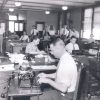calsfoundation@cals.org
Das Arkansas Echo
aka: Arkansas Echo
Das Arkansas Echo was a weekly German-language newspaper published out of Little Rock (Pulaski County) from 1891 to 1932. It promised an “allgemeine Zeitung für Wahrheit und Klarheit auf dem politischen und sozialem Gebiete” (general newspaper for truth and clarity in political and social realm). At the time of its establishment, it was one of three German-language newspapers in the state; the Arkansas Volksblatt of Fort Smith (Sebastian County) and the Arkansas Staats-Zeitung of Little Rock also provided news to German-speaking immigrants. The Echo reported a circulation of 850 in its early years, with circulation eventually reaching around 1,300.
The Echo’s predecessor was Der Logan County Anzeiger (Logan County Gazette), which was published by Conrad Elsken and had a circulation of around 400 before it was moved to Little Rock and reincorporated as the Echo. The Arkansas Echo Publishing Company’s incorporation papers list its founding members as John Kaufman, Adolph Arnold, Andrew Rust, P. B. Binzegger, Friedrich (Fred) Hohenschutz, Herman Lensing, Charles (Carl) Meurer, J. P. Moser, and Nic Peay. Historian Gregory Kehres reports that Hohenschutz served as the initial editor and Meurer as the assistant editor, with Meurer taking over all editorial duties at the end of 1892; however, the masthead never reflected Hohenschutz in the role as editor.
Meurer was a first-generation German who immigrated to Arkansas in 1881 at the age of thirty-two and became the Echo’s editor after first attempting farming. A staunch Roman Catholic, Meurer was greatly shaped by his experiences with religious discrimination in Germany, both privately and politically in the era of German chancellor Otto von Bismarck’s anti-Catholic laws. Under Meurer’s editorship, the newspaper developed a decidedly Catholic flavor, featuring stories on Bishop Edward Fitzgerald and Catholic parishes and organizations. However, the editors insisted that the paper was not solely Catholic and welcomed contributions and advertisements from Protestant and Evangelical Germans.
The initial issue was sabotaged when someone broke into the Echo office and destroyed the forms on which the edition was laid out for printing. Echo editors blamed rival Staats-Zeitung editor Philip Dietzgen. The incident touched off a year-long newspaper war, which devolved into lawsuits, threats of violence, and a fistfight between the editors that made national news. The source of the conflict was a complicated affair. In its inaugural year, the Echo worked to build a linguistic community, creating a sense of community among all German speakers, irrespective of religion; however, the Staats-Zeitung was apparently working to paint the Echo solely as a Roman Catholic newspaper so as to pigeonhole a business rival.
The eight-page weekly contained a number of regular features in its inaugural year. The front page usually offered a “Wochenschau” (review of the week), followed by world and national news. The editors registered the newspaper as “Democrat” in affiliation with Ayer’s Newspaper Annual, and in editorials of 1892, the staff focused on promoting the Democratic Party, arguing against prohibition of alcohol and the use of convict labor, and denouncing anti-immigrant forces and enemies of private German-language schools. Each issue additionally featured reports from correspondents in local German communities, news from Little Rock and around Arkansas, and an installment of a serialized novel. On a less regular basis, the paper offered its readers announcements of German organizations’ meetings; practical advice on agriculture, animal husbandry, and housekeeping; and educational pieces on culture, history, and philosophy. Advertisements printed in German offered the services of doctors and lawyers, groceries, department stores, and patent medicine purveyors.
The Echo served the German-speaking community for forty years, continuing publication even through World War I, when there was significant pressure on the state’s German communities to abandon German for English. The Echo’s continued existence was largely due to the resolve of its editor, Carl Meurer, who was so closely associated with the paper that he was referred to as the “Echo man” by his fellow immigrants. He died in the newspaper’s office at the age of eighty in 1930. A few weeks later, his son, Carl Meurer Jr., was appointed by the newspaper’s stockholders as the successor editor, but the founder’s demise also essentially meant that of the Echo. It ceased publication two years later.
For additional information:
Allsopp, Fred W. History of the Arkansas Press for the First Hundred Years and More. Little Rock: Parke-Harper, 1922.
Arkansas Echo. Chronicling America, Library of Congress. https://chroniclingamerica.loc.gov/lccn/sn88084068/ (accessed November 9, 2022).
Arkansas Echo Publishing Company. “Articles of Agreement and Incorporation.” Little Rock: Secretary of State of Arkansas, 1892.
“Carl Meurer Succeeds Father as Echo editor.” The Guardian, February 15, 1930, p. 1.
“Carl Meurer, Sr., Late Father of CUA Official, Pioneered Local Movement.” The Guardian, August 5, 1960, p. 6.
Condray, Kathleen. “Arkansas’s Bloody German Language Newspaper War of 1892.” Arkansas Historical Quarterly 74 (Winter 2015): 327–351.
———. Das Arkansas Echo: A Year in the Life of Germans in the Nineteenth-Century South. Fayetteville: University of Arkansas Press, 2020.
“Das Arkansas Echo (German).” American Newspaper Annual 1892. Philadelphia: N. W. Ayer & Son, 1892.
Dougan, Michael. Community Diaries: Arkansas Newspapering, 1819–2002. Little Rock: August House, 2003.
“German Newspaper Row.” Arkansas Gazette, November 5, 1892, p. 2.
“He Pied the Office.” Arkansas Gazette, December 29, 1891, p. 4.
Kehres, Gregory. “Carl Meurer: Pioneer Editor of the ‘Arkansas Echo.’” Unpublished document in the private collections of Kathleen Condray and Shirley Sticht Schuette.
Woods, James. Mission and Memory: A History of the Catholic Church in Arkansas. Little Rock: August House, 1993.
Kathleen Condray
University of Arkansas, Fayetteville
 Early Twentieth Century, 1901 through 1940
Early Twentieth Century, 1901 through 1940 Mass Media
Mass Media Post-Reconstruction through the Gilded Age, 1875 through 1900
Post-Reconstruction through the Gilded Age, 1875 through 1900 Arkansas Echo
Arkansas Echo 



Comments
No comments on this entry yet.